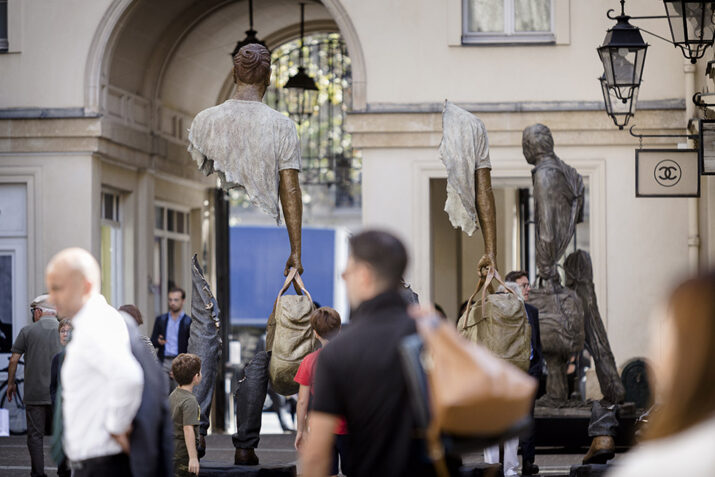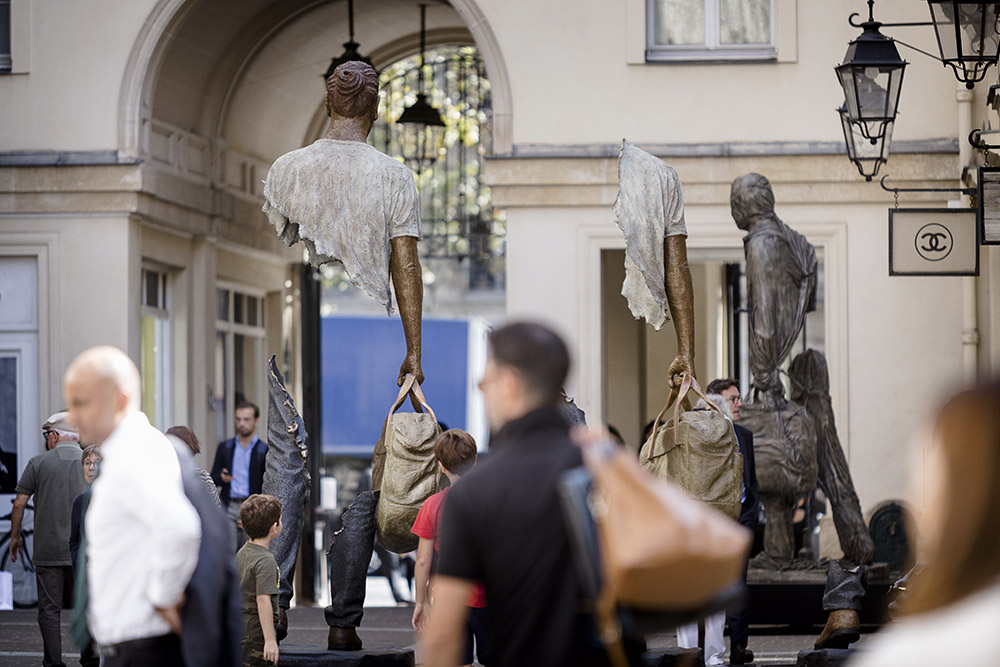

An introduction to our special feature, The Politics of Postmigration.
For more than a decade now, the concept of postmigration has been employed as a new theoretical frame within European cultural and social studies (e.g., Foroutan 2019, 2013; Yildiz and Hill 2017; Petersen and Schramm 2017; Schramm et al. 2019; Römhild 2020, 2021; Gaonkar et al. 2021). This concept has allowed for a rethinking of migration studies, the political borders of Europe, and the ongoing history of colonialism. It has also raised the question of how to de-essentialize and decentralize Eurocentric narratives of belonging. Within the German-speaking cultural context in particular, the term has mainly derived from activist-artistic knowledge produced by writers, theater producers, and artists who have been racialized, marginalized, and excluded, in spite of having been either born as second- and later-generation immigrants or socialized at the very core of European cultural metropolises such as Berlin. Thus, postmigration has been first and foremost employed as a political-activist label to free people from racist, colonial, derogatory, and diminishing attributions, especially within postmigrant theater in Germany. This form of theater was officially launched by Shermin Langhoff at Ballhaus Naunynstraße in Berlin in 2008, after having been probed at different locations since 2003 (Langhoff 2018; Schramm et al. 2019, 36-38).
Since the early 2010s, scholars—often directly inspired by the success of Langhoff’s postmigrant theater—have welcomed the concept. Consequently, in the years following the theater performances, the concept started being utilized across different academic settings (see Schramm et al. 2019, 11-63; Gaonkar et al. 2021, 14-23). However, while some scholars have continued to work on the political dimension of postmigration, often addressing the political conflicts occurring in what has been called a “postmigration society” (Foroutan 2019), others have used the concept mainly as an analytical tool to describe the aesthetic expressions of second and third generation immigrants. In addition, in some research contexts, the concept has been increasingly used outside of a reflection on the political background in which it has originated.
In this special feature, we reflect on the wider political aspects of postmigration. We address the way in which postmigration contributes to a critical understanding of the ambivalences and conflicts present in societies based on immigration. Collectively, the contributors to the first part of the feature focus on postmigration as a political practice and on interventions into migration studies that unveil how postmigration, as an analytical perspective, contributes to an epistemological turn, potentially accomplishing what Erol Yildiz once called an attempt to re-narrate and re-interpret “the phenomenon ‘migration’ and its consequences” (2013, 177). The second part of the feature on the ethics of care and the sociology of postmigration explores other usages of the term, both in relation to European migration politics—delving into the sociological transformations taking place in European societies—and in relation to ongoing attempts at fostering a de-essentialization of notions such as culture, belonging, and ethnicity, also focusing on how this de-essentialization can help prevent the pitfalls of a Eurocentric research perspective. All the authors included in the feature define what the concept brings to their research and add to current discourses on the politics of diversity, not only in Austria and Germany where the concept originated, but also elsewhere in Europe and beyond. Accordingly, the contributions point to an on-going research agenda on postmigration that has the power of becoming a political knowledge network.
By sampling current scholarly positions on “The Politics of Postmigration,” we highlight postmigration studies as a political practice. These approaches help to reaffirm the critical intent encapsulated in the term and position the concept more definitely within related academic discourses, such as those on superdiversity and multiculturality, postcoloniality and neocoloniality, and decolonization and Indigenization.[1] Hence, the feature’s contributors discuss what the concept of postmigration has to offer in different ways. While some engage with European politics, others focus on socio-political narratives of postmigration in literature, theater, pop culture, and film; these narratives help us critically understand the contemporary politics of exclusion and oppression. Today, it seems more urgent than ever to address racist violence and imperialist nostalgia, especially given that belonging remains contested in public and political discourses. In continuation of earlier and ongoing discussions, our special feature is meant as an invitation to keep these debates open. It is not our aim to present definitive answers but rather to broaden the perspectives and open them up for further discussions. This opening up requires a critical reflection on postcolonial theories and decolonial practices of postmigration; it also draws attention to current developments within such conceptualization, including those concerning the new terminology
Postmigration as political practice: interventions into migration studies
In the first contribution, educational studies scholars Anita Rotter and Erol Yildiz focus on the concept of postmigration within academia. In their article on “Postmigrantist Practices and Political Subjectification,” they explore a participant, subject-centered approach to migration studies that prevents what they label as “methodological migrantism.” Then, Marc Hill, also an education studies scholar, takes a similar path in his engagement with the Germanophone performance group migrantenstadl (migrant barn) at the Wiesbaden Biennale in 2018. In “Saving Europe? Agency in Postmigrant Art at the Wiesbaden Biennale,” he utilizes the way the group has resisted against hegemonic systems of governance to analyze postmigration as a novel practice of knowledge production that has been mostly developed by writers and artists.
Ethics of care and the sociology of postmigration
The second part of the feature starts with a contribution by European studies scholar Cristina Blanco Sío-López, who emphasizes the wellbeing of postmigrants. Her article on the “Structural Factors of Post-Migration Inclusiveness: The Struggle for EU Free Movement as a History of Possibility” delves into the impact of European politics and the harsh debates taking place within the European parliament about migration and asylum politics. Also concerned with wellbeing, Markus Hallensleben, a settler scholar at the University of British Columbia located on the traditional and ancestral territory of the Xwməθkwəy̓əm (Musqueam) people, focuses on the narrative turn in migration studies from the perspective of an ethics of care. In his contribution on “Unsettling the Politics of Belonging through Narratives of Radical Diversity and Indigenous Storywork,” he asks if and how the concept of postmigration allows for a consideration of the ongoing colonial politics of belonging in what is called Canada. He seeks to understand how the concept of postmigration stands in relation to the ways in which the Coast Salish Indigenous peoples share knowledge and how Eurocentric academia, colonialism, and migration are entangled. Finally, expanding on Hallensleben’s advocacy for a narrative turn, cultural studies scholar Moritz Schramm critically engages with what he perceives as a lack of sociological perspectives in postmigration theory. In “Political Conflicts in Postmigration Societies: A Sociological Perspective,” he outlines some of the future challenges facing the implementation of a politics of postmigration within Europe.
We understand this feature as part of an ongoing debate on the politics of postmigration and invite readers to critically respond to and enter the discussion. We hope to generate further contributions here or elsewhere, in particular about the wider discourses of diversity politics and decolonial scholarly activism within and outside European cultural and migration studies. Habitual readers of EuropeNow may not realize that before the journal, there was EUROPE NOW, a 2013 collective, intercultural, and transnational theater project that spanned across two European countries. It was, as Azadeh Sharifi (2020, 192)—a researcher in decolonial theater studies—indicated, one of the first attempts to practice postmigrant theater in Europe, intending to create a theater that would intervene in the political landscapes of a white political middle class. Participants in that project emanated from five different theaters in Stockholm, Istanbul, Amsterdam, London, and Berlin. Beyond the project’s political agenda, its participants believed that “diversity […] should be interpreted beyond the current fetishism for ethnicity” (qtd. in Sharifi 2020, 193). They produced five plays, a talk show on EUROPE NOW, and a film.[2] The pamphlet they created for a festival they organized made clear that when debating about “new European perspectives,” it is very much about the present of Europe. This special feature of EuropeNow follows in these footsteps. We were fortunate that Azadeh Sharifi, as well as Katrin Sieg, participated in the debate during our panel session at the 2021 Council for European Studies conference, helping us to stay close to the political dimension of postmigration theory. This feature takes up those discussions, widens European perspectives, and opens the concept of postmigration for broader conversations about the future of Europe and beyond.[3]
Research
- “Postmigrant Practices and Political Subjectification” by Anita Rotter and Erol Yildiz
- “Saving Europe? Agency in Postmigrant Art at the Wiesbaden Biennale” by Marc Hill
- “Structural Factors of Post-Migration Inclusiveness: The Struggle for EU Free Movement as a History of Possibilities, 1985-2015” by Cristina Blanco Sío-López
- “Unsettling the Politics of Belonging through Narratives of Radical Diversity and Indigenous Storywork” by Markus Hallensleben
- “Political Conflicts in Postmigration Societies: A Sociological Perspective” by Moritz Schramm
Visual Art
Fiction
Campus
Markus Hallensleben is Associate Professor at the Department of Central, Eastern, and Northern European Studies and Steering Committee Member at the University of British Columbia’s Centre for Migration Studies, where he co-organizes a transdisciplinary research group on narratives of migration and belonging: https://migration.ubc.ca/research/research-groups/narratives/.
Moritz Schramm is Associate Professor at the Department of Language, Culture, History and Communication at the University of Southern Denmark. He has been working with postmigration theory for many years, among others as PI of the collaborative research project “Art, Culture and Politics in the Postmigrant Condition” (2016-8).
References
Foroutan, Naika. 2013. “The ‘New Germany’ and Its Transformation Process: Narrating Collective Identity in Times of Transnational Mobility.” In Rethinking the Public Sphere Through Transnationalizing Processes: Europe and Beyond, edited by Armando Salvatore, Oliver Schmidtke and Hans-Jörg Trenz, 233-250. London: Palgrave Macmillan UK.
—. 2019. “The Post-Migrant Paradigm.” In Refugees Welcome? Difference and Diversity in a Changing Germany, edited by Jan-Jonathan Bock and Sharon Macdonald, 142-167. New York: Berghahn.
Gaonkar, Anna Meera, Astrid Sophie Ost Hansen, Hans Christian Post, and Moritz Schramm. 2021. Postmigration. Art, Culture, and Politics in Contemporary Europe. Bielefeld: transcript. https://www.transcript-verlag.de/978-3-8376-4840-9/postmigration/?number=978-3-8394-4840-3 (accessed 2021/09/29).
Langhoff, Shermin. 2018. “Nachwort.” In Postmigrantische Perspektiven. Ordnungssysteme, Repräsentationen, Kritik, edited by Naika Foroutan, Juliane Karakayali and Riem Spielhaus, 301-310. Frankfurt am Main: Campus.
Schramm, Moritz, Sten Pultz Moslund, Anne Ring Petersen, Hans Christian Post, Mirjam Gebauer, Sabrina Vitting-Seerup, and Frauke Wiegand. 2019. Reframing Migration, Diversity and the Arts: The Postmigrant Condition. New York: Routledge. https://www.routledge.com/Migration-Diversity-and-the-Arts-The-Postmigrant-Condition/Schramm-Moslund-Petersen/p/book/9781138584099 (accessed 26 April 2019).
Petersen, Anne Ring, and Moritz Schramm. 2017. (Post-)Migration in the Age of Globalisation. New Challenges to Imagination and Representation. Journal of Aesthetics & Culture 9 (2): 1-12. Accessed 12 May 2018, https://doi.org/10.1080/20004214.2017.1356178.
Römhild, Regina. 2020. “Andere Europas: Soziale Imagination an der Schnittstelle von Kunst, Politik und Ethnografie.” Europa – Spiel ohne Grenzen?, edited by Michael Bachmann and Asta Vonderau, 17-36. Bielefeld: transcript. https://doi.org/https://doi.org/10.14361/9783839427378.
—. 2021. “Postmigrant Europe: Discoveries beyond ethnic, national and colonial boundaries.” Postmigration: Art, Culture, and Politics in Contemporary Europe, edited by Anna Meera Gaonkar, Astrid Sophie Ost Hansen, Hans Christian Post and Moritz Schramm, 45-56. Bielefeld: transcript Verlag. https://doi.org/doi:10.1515/9783839448403-003.
Sharifi, Azadeh. 2020. “Theater und Migration: Überlegungen zu einer europäischen Perspektive des postmigrantischen Theaters.” Europa – Spiel ohne Grenzen?, edited by Michael Bachmann and Asta Vonderau, 181-196. Bielefeld: transcript. https://doi.org/https://doi.org/10.14361/9783839427378.
Yildiz, Erol (2013): Die weltoffene Stadt. Wie Migration Globalisierung zum urbanen Alltag macht, Bielefeld: transcript.
—, and Marc Hill. 2017. In-Between as Resistance: The Post-Migrant Generation between Discrimination and Transnationalization. Transnational Social Review 7 (3): 273-286. Accessed 20 Nov. 2018. https://doi.org/10.1080/21931674.2017.1360033.
[1] This intent was also at the center of our discussions during two panels on the “Politics of Postmigration: Beyond Politics of Belonging” at the CES Virtual 27th International Conference of Europeanists on “Europe’s Past, Present, and Future: Utopias and Dystopias” in 2021. Azadeh Sharifi (University of Toronto) and Katrin Sieg (Georgetown University) gratefully served as discussants.
[2] See http://web.archive.org/web/20131221075927/http://europenowblog.org/. Accessed 30 March 2023.
[3] This publication grew out of a collaborative research project on “Migration as Core Narrative of Plural Societies: Towards an Aesthetics of Postmigrant Literature,” funded by SSHRC Insight Development Grant No. 430-2019-00686. We especially thank Daniel P. Gámez for his editorial support. The work on this special feature was also supported by a Carlsberg Foundation Monograph Fellowship (CF21-0608, Schramm).
Sculpture by Bruno Catalano, Village Royal, Quartier de la Madeleine, Paris, 2018. Photographie : Pierre-Yves Brunaud
Published on May 1, 2023.




